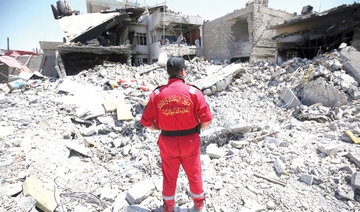JEDDAH/MOSUL: Iraq said Daesh’s “caliphate” was coming to an end three years to the day after it was proclaimed, following the recapture of Mosul’s iconic Al-Nuri Mosque on Thursday.
The terror group announced its “caliphate” on June 29, 2014, across swathes of territory its fighters overran in Iraq and neighboring Syria.
Staff Lt. Gen. Abdulghani Assadi, a senior Counter-Terrorism Service (CTS) officer, confirmed the mosque’s recapture.
Iraqi Prime Minister Haider Al-Abadi hailed it as a sign of Daesh’s impending defeat. “We are seeing the end of the fake Daesh state,” he tweeted.
But Oubai Shahbandar, a Syrian-American analyst and fellow at the New America Foundation’s International Security Program, advised caution before declaring Daesh finished.
“It’s important that we remain cautious and vigilant of efforts by Daesh to transform itself into an underground movement,” he told Arab News. “Daesh maintains long-term ambitions despite its loss of Mosul and significant amounts of territory in the past two years. If the international coalition drops the ball and doesn’t invest in rebuilding, political reconciliation and ensuring that the rule of law — not sectarian militias — maintain order, Daesh will find the opportunity it needs to re-emerge.”
Shahbandar said the Iraqi government should avoid committing the mistakes of Al-Abadi’s predecessor Nuri Al-Maliki.
“The previous administration … demonstrated exactly what not to do when it comes to ensuring that a defeated terrorist insurgency doesn’t re-emerge,” he said.
“The lessons learned from 2010-2013 in Iraq and Syria are telling. The regime in Baghdad at the time maintained narrow sectarian political ambitions that prioritized a paranoid regime-centric mindset rather than actual security. Daesh was able to expand as a result, even though its predecessor, the Islamic State of Iraq (ISI), was largely defeated militarily.”
Shahbandar said the seeds of Daesh’s emergence were planted and allowed to grow in fertile soil by the regime of Syrian President Bashar Assad, which before 2011 gave small units of the ISI leadership safe haven in eastern Syria.
“The consequences of poor governance and the brutality of the Assad and Al-Maliki regimes hopefully will serve as a wake-up call to the international community and show that the defeat of groups such as Daesh shouldn’t pave the way to the chaotic brutality and incompetence of regimes such as Assad’s and Al-Maliki’s,” he said.
On fears about Al-Hashd Al-Shaabi taking over liberated areas, Shahbandar said the Shiite militia “isn’t going to lay down its arms after Daesh is defeated in Iraq. It has become a state within a state, much along the lines of how Hezbollah now controls the Lebanese government. Al-Hashd leaders retain the ability to act with little or no checks on their power by the central government in Baghdad. This is a recipe for disaster that may bring forth a Daesh 2.0 in the near future.”
He added: “Daesh’s leadership is now confined to a small part of Syrian rural desert terrain and the lower Euphrates River valley in small pockets in western Iraq. The leadership structure has more or less been eliminated by international coalition strikes and local forces. But Daesh has a way to rebuild if it’s offered the opportunity to do so. Al-Qaeda’s original leadership was almost totally wiped out, yet a new generation took over and allowed the terrorist group to continue global operations. That should serve as a reminder that the fight against Daesh doesn’t end simply with the liberation of Mosul and Raqqa.”
Columb Strack, senior Middle East analyst at IHS Markit, said Daesh’s “rise and fall has been characterized by rapid inflation followed by steady decline. Three years after the ‘caliphate’ was declared, it’s evident that the group’s governance project has failed.”
IHS senior Middle East analyst Ludovico Carlino said: “Losing control of the heavily populated Iraqi city of Mosul, and oil-rich areas in the Syrian provinces of Raqqa and Homs, has had a particularly significant impact on the group’s ability to generate revenue.”
— With input from AP, AFP
Iraq sees end to terror group as iconic Mosul mosque is recaptured
Iraq sees end to terror group as iconic Mosul mosque is recaptured














